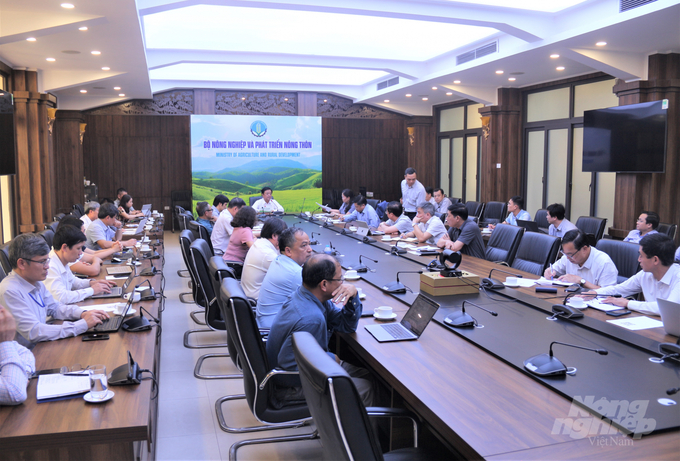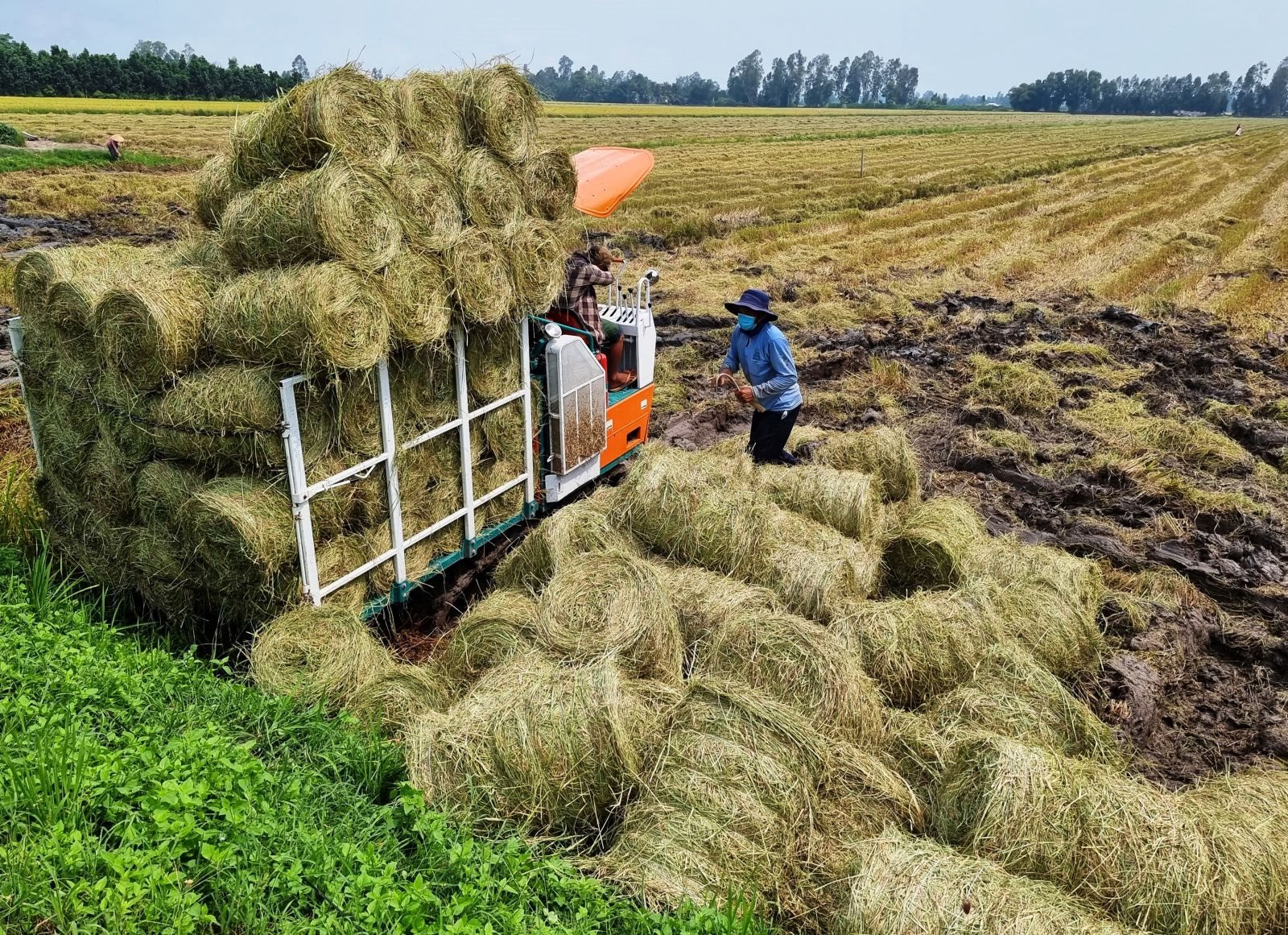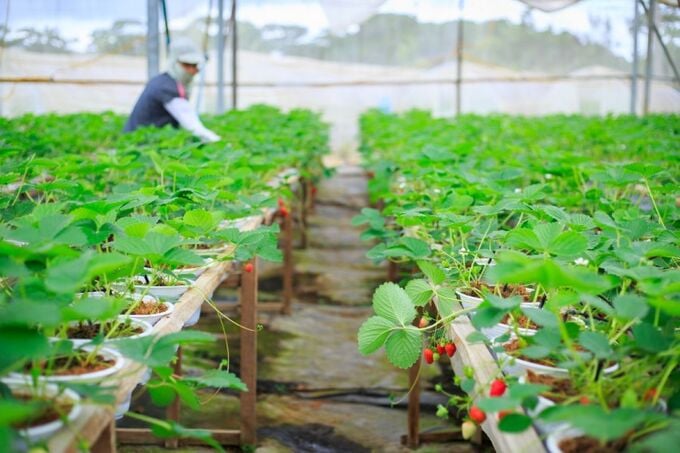June 15, 2025 | 21:02 GMT +7
June 15, 2025 | 21:02 GMT +7
Hotline: 0913.378.918
June 15, 2025 | 21:02 GMT +7
Hotline: 0913.378.918

Minister of Agriculture and Rural Development Le Minh Hoan chaired a meeting to discuss the development of circular agriculture. Photo: Pham Hieu.
The Ministry of Agriculture and Rural Development conducted a discussion on developing circular agriculture on March 23. In discussing the role of circular economy in agricultural sustainable development, Tran Cong Than, Director of the Institute for Policy and Strategy for Agriculture and Rural Development (IPSARD), stated that in terms of the environment, circular economy helps reduce input material and energy while the resources in the system are reused several times. CO2 and waste-neutral renewable energy sources may be utilized in nature as fertilizer sources.
In terms of economic benefits, the circular economy aids in the reduction of damage and loss; the reduction of costs associated with waste management and control; the reduction of costs associated with environmental regulations such as taxes and insurance; the reduction of material and energy costs; and the reduction of the use of materials derived from rare resources.
"New markets for valuable materials will emerge, particularly as the circular economy evolves. Such resources will then have a higher commercial worth. Furthermore, firms that use the circular economy model will be more appealing and able to attract more investment as a result of developing a responsible image as well as the potential of the green market "Tran Cong Thang stated.

Currently, the total production of by-products in Vietnam is 156.8 million tons. Photo: TL.
Thang further stated that Vietnam presently produces 156.8 million tons of waste byproducts. As a result, the potential for the establishment of a circular economy in Vietnamese agriculture is considerable. This raw material source should be regarded as an essential input, expanding the value-added chain in agriculture.
"For now, the usage of these rare resources is still limited. According to the statistics, agricultural residue collection rates are only 52.2%, livestock production is 75.1%, forestry is 50.2%, and fisheries are 90%. While just 43% of livestock waste and 33.2% of plant processing waste can be utilized, the rate of collection and treatment of agricultural byproducts that provide additional value remains low "Tran Cong Thang said.
According to MARD Minister Le Minh Hoan, the present approach to circular agriculture growth is sluggish. We have yet to recognize the benefits and devise a strategy to address the trend that the circular economy has brought to our farm.
"We must identify the circular economy as a solution for sustainable development, the core economy, and the future trend." To approach and address the issue, we must first define the item to which we are focusing our attention. In this sense, it is critical to approach the attitude of helping people to establish circular agriculture so that it can serve the people again. In other words, a distinct place, a separate way, and suited for the growth of circular agriculture are required "Minister Le Minh Hoan examined the situation.

Agricultural production not only creates food but also has to bring other valuable products from other industries. Photo: TL.
According to the minister, one of the major barriers impeding the development of a circular economy in agriculture is a lack of attitude and knowledge.
"We called them agricultural byproducts is how we show how much it is underestimated. As a result, they should not be referred to as by-products, but rather as raw resources for agricultural reuse."
The commander of the agricultural sector, in particular, emphasized that circulation in agriculture must be oriented to many other values. Agriculture production must not only provide food but also bring in value goods from other businesses.
Vietnam has approved a National Green Growth Strategy for the 2021-2030 period, with a vision to 2050. In green development and climate change, the country has made strong commitments such as reducing the net emissions to zero by mid-century, reducing global methane emissions by 2030, joining the Glasgow declaration on forests and land use, and joining the global declaration on transitioning coal power into clean energy.
Vietnam is developing two big goals: it is striving to become a developing country by 2030 with modern industry and high average income and by 2045, it will become a developed country with high income. And green development would foster Vietnam to realize these goals.
Translated by Linh Linh

(VAN) The working delegation from the Ministry of Agriculture and Environment conducted an important trip to the Netherlands to strengthen strategic partnerships and sustainable development in the agricultural sector.

(VAN) The letter ‘A Plea from the Ocean’ not only evokes emotion but also awakens the human conscience to the responsibility of protecting life on Earth.

(VAN) The Department of Agriculture in South Africa has announced the country’s first mass vaccination of poultry to prevent local birds from contracting avian influenza.

(VAN) Establishment of the Mekong Delta Regional Agricultural Linkage Center, aiming for a closed value chain, deep processing, trading platforms, and international market connectivity.

(VAN) Gia Lai province has recently recorded 460 rare species of animals and plants, contributing to forest conservation and biodiversity planning in the region.

(VAN) Ms. Caroline Beresford, New Zealand Ambassador to Vietnam, expressed confidence that agricultural cooperation between Vietnam and New Zealand will develop sustainably, be climate-resilient, and promote gender equality.

(VAN) Vietnam reaffirms its commitment to international cooperation in fostering sustainable and responsible fisheries while ensuring resilient livelihoods for small-scale fishing communities.